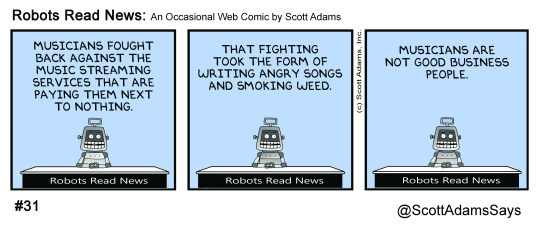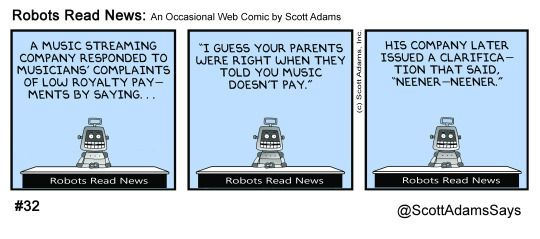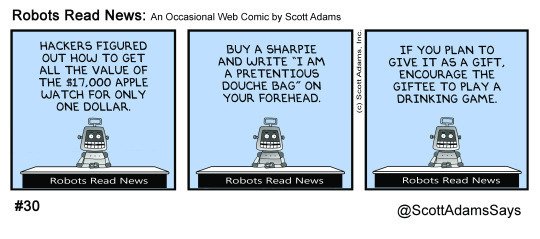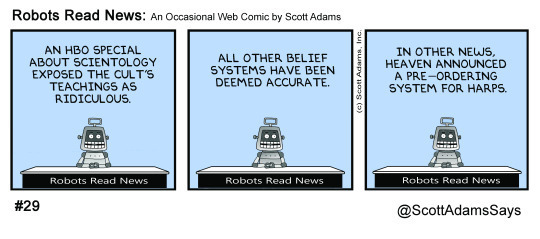Scott Adams's Blog, page 295
April 14, 2015
Robots Read News - About Music Streaming
If your firewall is blocking these images, see them on Twitter here.


Predicted Sharing: High. Popular topic in the news. Gentle humor and a clear target audience. Weed reference will inhibit sharing a bit.
Humor Dimensions: recognition, cruelty, bizarre (talking robot)
Over at Top Tech Blog:
A gyroscope smaller than a human hair moves humankind one step closer to spreading our DNA to far-off words on millions of tiny, inexpensive rockets launched at the end of Earth’s run. But I might be reading too much into it.
If you think self-driving cars are scary, wait until your doctor is software. Every new medical device seems to move us in that direction. Here’s a new one for eye exams.
In other news, a researcher says,
“A highly coherent qubit, like the spin of a single phosphorus atom in isotopically enriched silicon, can be controlled using electric fields, instead of using pulses of oscillating magnetic fields.” And thank God for that, I say.
That is all for today.
Scott
My book on success: “Brilliant, Useful, Funny. Way up there with the very best self-help books I’ve encountered….Highly recommended. (Amazon 5-star review by Chris Weekly on April 6, 2015)

April 13, 2015
Human Rights for Robots
What will happen when computers can simulate human thinking well enough to fool us every time? Will the machines appear “alive” but somehow soulless to us?
The major religions of the world believe humans have souls. What happens to those belief systems when we see robots that think and act exactly like real humans while possessing no soul? The age of robotics could replace religion, at least for the young. We will come to see our bodies as moist robots working according to the rules of physics, not magical beings with invisible souls that guide our actions. In other words, when robots start acting exactly like humans, humans will feel more like robots at the same time. It probably works both ways.
Will our human-like robots eventually have human-like rights? I think they will because a robot is a valuable asset and so the legal protections would probably be similar on economic grounds alone. For example, someday you will see laws that say you can’t discriminate against robots in hiring. And that makes perfect sense because the robots will be owned by humans, and the humans will be trying to extract the greatest value from their worker robots by sending them out to jobs. Employment laws will probably change thanks to robot industry lobbying efforts, and that includes equal employment access for robots, whether it is good for most humans or not.
At some point in human history – and I think today’s kids will live to see it – humans and robots will be working together, living together, and probably dating.
And once we start dating robots, humans will demand equal rights for their robot partners. Robot manufacturers will lobby for equal rights for robots to support their business models. And humans will program some robots to be activists fighting for rights.
The penalty for “murdering” a robot will be light compared to murdering a human. But that distinction will disappear over time as robots develop their own personalities based on their individual experiences. If a hacker wiped out the memory of a robot, including the cloud backup, the human owning the robot would lose a best friend, maybe a co-worker, and maybe a lover.
So the penalty for injuring a robot’s body might remain low, assuming cloud backups are available and robot bodies are insured. This is similar to human law in the sense that injuring someone is a lower penalty than killing. But the penalty for destroying a robot’s memory database and evolved personality might someday become equal to human murder penalties if only because of the emotional damage to the human survivors.
Once the robots become our step-parents, our lovers, our friends, and our co-workers, we will start treating the robot’s cloud backup as its “soul” and we will create laws that treat the killing of a human and the deleting of a robot’s cloud memory as equal.
I float a lot of wild ideas on this blog. But I give today’s prediction of robots acquiring “human rights” a likelihood of 99% for a child born today who lives out a normal lifespan.
I also think it is 99% certain that humans will move their “minds” into computers at some point in human history. But we won’t want to do that until we know our new bodies will have rights equal to our old bodies. And we won’t want to live as soulless minds in robots until we come to believe our moist robots have no souls.
The two preconditions (outside technology) for moving human minds to computers are:
1. Equal (or similar) rights for robots and humans.
2. A belief that souls do not exist.
Both conditions will be satisfied. My guess is that the technology part will be available in 10-20 years.
On another note, I think the odds of robots eroding religion to irrelevance by reducing belief in souls is about 50%. There is an equal chance that religion will adapt and start treating robots as God’s creations via humans who are divinely inspired. Surely there will be a Catholic-approved “soul module” for robots someday. And robots might go to church for the same reasons humans do.
Do you agree we will have nearly-equal rights for robots someday?
Bonus Creepy Thoughts: Someday you will attend a funeral for Grandpa and an hour later the robot version of grandpa will walk in the door and ask how it went. The day you lose someone will be the day the robot version can be legally activated. You can’t have two versions of the same person running around. It would be chaos.
The big problem with eternal life is that some people deserve to die. So let’s say that by the time we have the technology to move human minds to silicon we also have the ability to delete corrupt subroutines at the same time so the robot version of you has fewer mental issues.
So all robots would be more awesome than the human personalities that seeded them. We’d leave behind all the baggage, depression, and bad experiences. We’d amp up our happiness, our tolerance for others, and perhaps our integrity. The robot version of you would have better character than human you.
On day one, your robot form would resemble your old human form, flaws and all. But over time you would upgrade your robot body to be more attractive because beauty provides an advantage over the still-moist portion of the population.
Scott
Twitter: @scottadamssays
On the Top Tech Blog:
Drones with human-like eyes and reflexes to avoid mid-air collisions.
Imagine insect-sized drones flying in swarms. How would a defender keep them out?
And super-cheap radar will makes drones see better too.
Put it all together and before long your terrorists will be launching drone swarms that invade a city and wait for pedestrians to open doors so they can tailgate behind and detonate inside. Luckily for you, I already wrote that book years ago so you can find out how it all ends.
——————————————–
Speaking of books…
My book on success: “Brilliant, Useful, Funny. Way up there with the very best self-help books I’ve encountered….Highly recommended. (Amazon 5-star review by Chris Weekly on April 6, 2015)

April 10, 2015
Robots Read News - $17,000 Apple Watch
I posted this comic on Twitter a few minutes ago and already I can tell it will be the most retweeted content I have ever created.
If your firewall is blocking the image, see it on Twitter here.

Humor Dimensions: Cruel, clever, recognizable, bizarre (talking robot)
Predicted Virality: High (already obvious). Reference to drinking games might inhibit sharing but only slightly because drinking is legal. Apple watch topic is in the headlines and top-of-mind this morning. And the comic probably says what folks are thinking, but says it better than they were thinking it (which is a key to sharing).
My Twitter followers are 95% male, so a drinking games theme plus technology should be popular.
A computer so small you can inject it into your body and it will take photos. The ultimate selfie because, as Mom told you, it is what you have on the inside that counts.
Lasers replace WiFi (within a room).
Holographs you can “feel” with your hands. Holy crap.
——————————————–
Scott
Twitter: @scottadamssays
My book on success: “Brilliant, Useful, Funny. Way up there with the very best self-help books I’ve encountered….Highly recommended. (Amazon 5-star review by Chris Weekly on April 6, 2015)

April 9, 2015
Women in Tech
On the list of most influential tweeters on the issue of women in tech, number four is … me?
Raise your hand if you saw that coming.
Scott

Slave Parents
A few years ago my parents came for a visit. My mother had terminal lung cancer but she was keeping it a secret. I was host for the week, and it was hard to come up with ideas to keep my parents entertained because they had limited mobility. I asked my mother if she wanted to watch me play tennis.
Before you hear my mother’s answer, you need some background.
I played tennis on my high school team. It was a tiny school (40 people in my class), so getting on a sports team was easy. Still, neither of my parents ever watched me play tennis. Not once.
Time passes, and tennis becomes my primary athletic hobby as an adult. So much so that I built a tennis court in my house. (It’s the room at the end of the hallway.). My social life was centered around tennis. Tennis was a big deal in my life. I thought my mother would want to see me play at least once before she died. So I asked.
This was her response: “Why would I watch you play tennis? I want to play.”
The next hour of my life was comical and painful. Both parents hobbled out on the tennis court and sometimes swung rackets in the general direction of a ball. To be kind, let’s just say things would have gone the same way whether or not their rackets had strings. My 83-year-old father literally stood in the middle of the court, using a cane, with his arthritic neck so jacked-up that he couldn’t even look in the direction of the oncoming ball. He would just hear something bounce near him and swat the racket toward the noise.
In the end, my parents “played” tennis instead of simply watching. And for some odd reason they seemed to enjoy the experience.
This brings me to my topic of slave parents. Today it would be considered a parental crime to miss a kid’s sporting or school event. The thinking, as I understand it, is that the feelings of children are important whereas the health and happiness of adults is far less important. So you WATCH your kids playing a sport while you sit there getting fat and unhealthy. Does that arrangement make sense?
In my town, entire families are yanked around by school sports. Kids are treated like celebrity athletes with their parents serving as chauffeurs, chefs, and personal assistants. There are tournaments out of town, practices, games and banquets. Being a parent of a student athlete is a full-time job. Is it worth it?
Being a student athlete has many character-building benefits and it is good for health. But student athletics has evolved into a weird cult activity that no longer seems connected to the point of it all. It feels like an obligation and a social expectation.
One could imagine a better system that allows kids to get all of the benefits of sports while letting the parents enjoy a healthy lifestyle at the same time. My mother had such a system. When I played my high school tennis, she did whatever she needed to do as mom, and that was plenty. She usually had a job too.
Like any kid, I wanted my parents to watch me play my sport. But it would have been selfish to ask them to sit in the hot sun for hours while I enjoyed myself and they did not. The problem was my expectations, not the actions of my parents. What right did I have to expect them to sit around while I had fun and improved my fitness?
In my opinion, school sports are a crime on families. If you have a kid involved in a sport, your life is being managed by strangers and social expectations. That is no way to live. The system of school sports is deeply broken.
How would you fix the system while keeping the benefits of sports?
——— In Other News ——–
Brainiacs at MIT have developed a cooler to keep food cold without electricity. All it needs is water and sun. This could be huge for developing countries where food storage is nearly impossible.
—————————————-
Scott
Twitter: @scottadamssays
My book on success: “Brilliant, Useful, Funny. Way up there with the very best self-help books I’ve encountered….Highly recommended. (Amazon 5-star review by Chris Weekly on April 6, 2015)

April 8, 2015
Humor From Headlines
I explain to Business Insider how to get Dilbert office humor from the Iranian nuclear deal.

Wheelchairs in Space
The other day a friend suggested building orbiting space stations for folks with mobility problems. Wheelchairs and walkers are optional in zero gravity. Grandma could fly around the space station all day long.
Gravity is a real drag here on Earth. I can imagine millions of seniors and folks with mobility problems preferring the free-floating life on a space station.
Cost is an issue, obviously. But wealthy retirees with mobility problems might gladly shell out a million dollars for a flight to the station. Over time, costs will drop. And insurance companies might start writing space station retirement policies. Perhaps you would buy the space station insurance when you are young, in case you need it later.
At some point in the future I imagine it will feel cruel to leave folks with mobility issues here on Earth.
This future feels inevitable, although it might be a hundred years away. What do you think?
—— In other news ————-
Drone package deliveries are coming soon, and Amazon is only one of the players. How long before criminals invent drones that shoot down delivery drones and take their payloads? I give it five years. Then it will be war up there.
And soon your doctor will have a holographic image of your guts so he can really see what’s going on in there. This feels about two technologies away from making human doctors unnecessary. Once I have a holographic scanner at home, and a robot to do surgeries, I will detect my own tumors and have my robot remove them. What could go wrong?
And how about a battery that charges in one minute and won’t catch on fire? It might be coming soon, but Elon Musk says be skeptical.
Scott
My book on success: “Brilliant, Useful, Funny. Way up there with the very best self-help books I’ve encountered….Highly recommended.
(Amazon 5-star review by Chris Weekly on April 6, 2015)

April 7, 2015
Is The Slippery Slope Real?
Is the Slippery Slope argument EVER rational?
One example of a slippery slope that I keep hearing is seat belt laws. Seat belts started out as optional equipment but eventually became mandatory.
But that seems like a reasonable change. Are we afraid of reasonable changes?
So I put the question to you. Please submit your examples of times when the slippery slope was real. Good examples of the Slippery Slope have this pattern:
1. Starts off as a reasonable thing.
2. Slips into an unreasonable thing
Seat belt laws started reasonable and got even more reasonable when there was data on how many lives they saved. So that would not be a slippery slope case.
What is?
Scott
———- In other news ————-
Soon you will be able to diagnose some health issues with a camera. That’s why I plan to stop smiling for pictures. It would look weird to be smiling in a photo that shows I am on death’s door. That would be creepy.
And what happens when all 7 billion humans have Internet access and form a godlike mind? Will we become a new species with the Internet as our central nervous system? I think I wrote that book.
——————————————
@ScottAdamsSays (my dangerous tweets)
@Dilbert_Daily (Dilbert-related tweets)
My book on success: “I feel the best I have ever felt after reading a book.” - Puget Sound Paralegal (Amazon 5-star review Feb 20, 2015)

April 6, 2015
Robots Read News - About Scientology
April 5, 2015
Voluntary Parent Tests
Humorists have often pointed out that you need a license to go fishing but you don’t need a license to create a human being and ruin its life through bad parenting.
I can’t imagine my government requiring a license for parenting, no matter how sensible the idea sounds. To do so would be incompatible with basic freedom.
But what about a voluntary test for parents?
I think you would see immense social pressure for newlyweds to pass a voluntary parenting test whenever children are in the plan. At first the test would be a novelty and I imagine it would generate ridicule. But in time it could become the first question anyone asks when you announce your engagement. “Did you both pass the parenting test?”
The government could offer tax incentives for anyone who passes the parenting test. That would be a good investment for the country because better parenting is probably good for the economy in the long run.
Another thing I would like to see is kids writing reviews of their own parents. All you need is a Yelp-like service for reviewing parents, with a twist that the reviews are NOT public. Only approved professionals (doctors, therapists, teachers, other experts) would see the reviews. This allows experts to jump in with some useful parenting advice for both the kids and their parents. My healthcare provider, Kaiser Permanente, would be ideal for such a service. They’re big on preventative care.
And imagine Big Data someday helping you set child “consequence” levels. For example, if Big Data says taking away a teens phone for three days gets a good result but taking it away for a month just makes things worse, that would be good to know. And it would be easier for parents to defend a punishment as “fair” if Big Data supports it. A parent will still need to adjust his or her strategy for the personality of the child, but it is useful to have a starting point.
And here’s a suggestion for helping low-income kids get a leg up. Imagine a law that says any child born into a household below a certain income level can be voluntarily matched up with two mentors from high income families. And let’s imagine there is an online service for making those matches. And one can imagine the government offering tax incentives for folks who are part of a successful mentoring arrangement.
The future of parenting, I hope, is voluntary parenting tests, Yelp-like reviews of parents (non-public, to invite professional intervention), Big Data to guide parenting strategy, and a voluntary mentoring program for low-income kids that is supported by tax incentives.
Would any of those ideas work?
————- In other news ——————
Cyborg rats with brain implants are here! But let’s not make cyborg rats that are too smart, okay? That has trouble written all over it.
And how about the self-driving car that went across the country 99% unaided? Maybe it’s just me, but I have lots of questions about the 1%.
And finally someone is making a running boot that does some of the running for you. But only 7% of it. I can’t wait for them to get the other 93% done so I can do some serious sleep walking.
————————————————————-
@ScottAdamsSays (my dangerous tweets)
@Dilbert_Daily (Dilbert-related tweets)
My book on success: “I feel the best I have ever felt after reading a book.” - Puget Sound Paralegal (Amazon 5-star review Feb 20, 2015)
Scott Adams's Blog
- Scott Adams's profile
- 1258 followers




